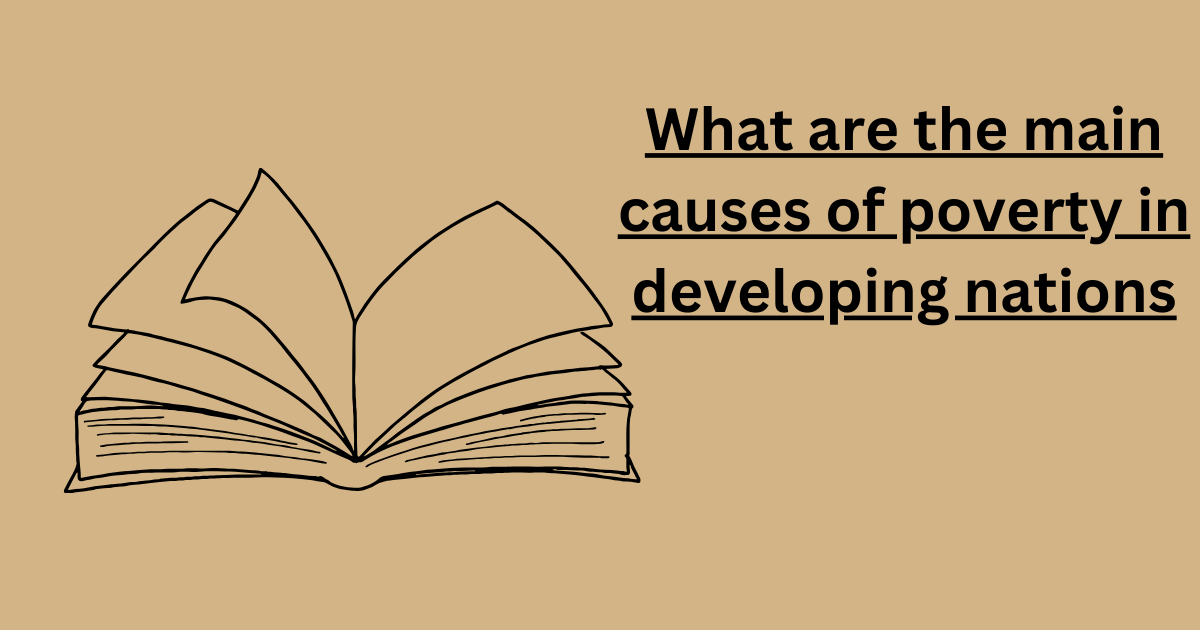What are the main causes of poverty in developing nations, Poverty remains a pervasive challenge in developing countries, affecting millions of lives and hindering economic growth. Grasping the fundamental causes of poverty is essential for creating effective solutions. Here, we explore the primary causes of poverty in these regions.

What are the main causes of poverty in developing nations
- Lack of Education
Education is a cornerstone of economic development. In many developing countries, access to quality education is limited, particularly in rural areas. High illiteracy rates restrict individuals from obtaining stable jobs, leading to a cycle of poverty. Moreover, without education, people are often unaware of their rights and available resources, further entrenching them in poverty.
- Unemployment and Underemployment
High unemployment rates are common in developing nations, often due to insufficient job creation and economic opportunities. Even when jobs are available, many individuals find themselves in underemployment situations, working in low-paying or informal sectors. This lack of adequate employment stifles income growth and economic mobility, perpetuating the poverty cycle.
- Political Instability and Corruption
Political instability and corruption can significantly impede development efforts. Corruption diverts resources away from essential services, such as healthcare and education, while political turmoil can deter foreign investment and disrupt local economies. This creates an environment where poverty thrives, as the government’s capacity to implement poverty alleviation programs diminishes.
- Economic Dependence
Many developing countries rely heavily on a narrow range of exports, such as raw materials or agricultural products. This economic reliance renders them susceptible to changes in global market conditions. When prices drop, the economy suffers, leading to job losses and increased poverty rates. Diversifying the economy is crucial for reducing this vulnerability and fostering sustainable growth.
- Health Issues
Poor health is both a contributing factor to and a result of poverty. Limited access to healthcare services means that preventable diseases can have devastating effects on communities. High rates of illness reduce the workforce, making it difficult for families to earn a stable income. Additionally, healthcare expenses can push already struggling families further into debt, exacerbating their poverty situation.
- Social Inequality
Social inequality often manifests in various forms, including gender, ethnic, and economic disparities. In many developing countries, marginalized groups face discrimination, limiting their access to education, employment, and healthcare. This systemic inequality results in a disproportionate number of individuals living in poverty, perpetuating cycles of disadvantage.
- Environmental Challenges
Environmental issues, such as climate change, deforestation, and natural disasters, disproportionately affect developing countries. Many communities rely on agriculture for their livelihoods, making them vulnerable to environmental degradation and unpredictable weather patterns. These challenges can lead to food insecurity and loss of income, further entrenching poverty.
- Infrastructure Deficits
Inadequate infrastructure, such as poor transportation, limited access to clean water, and unreliable electricity, hampers economic development. Without proper infrastructure, businesses struggle to operate efficiently, and individuals find it challenging to access jobs and services. This infrastructure deficit stunts economic growth, keeping communities in a cycle of poverty.
Conclusion
The causes of poverty in developing countries are complex and interrelated. Addressing these issues requires a multi-faceted approach that includes improving education, creating job opportunities, fostering political stability, and promoting social equality. By tackling the root causes of poverty, we can work towards a more equitable and prosperous future for all.
In conclusion, understanding the nuances of poverty in developing countries is essential for policymakers, NGOs, and communities to implement effective strategies that can create lasting change and improve the quality of life for millions.
Read more***
I appreciate the depth and clarity of your analysis—great job!
This is a fantastic post!
Yessir! Found a sweet promo code on 1winpromocode. Stacked up on some extra cash. Best way to find free bonuses out there, give it a whirl! Get your bonus now 1winpromocode!